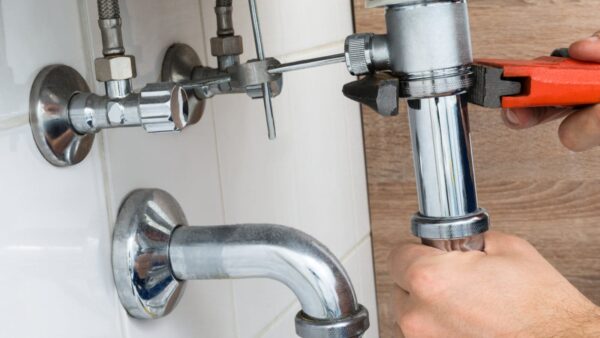
Your home’s plumbing is much like its circulatory system, quietly enabling day-to-day functions, including cooking, cleaning, and maintaining hygiene. Many homeowners need to pay more attention to regular plumbing maintenance when faced with an unexpected disaster such as a burst pipe or severe leak.
Proactive maintenance can significantly minimize such risks, enhancing household efficiency and comfort.
Key Takeaways
- Frequent plumbing maintenance may increase the efficiency of your house and save expensive repairs.
- Understanding basic plumbing tasks can save you money and stress.
- Utilize professional guidance and resources for complex plumbing issues.
The Importance of Plumbing Maintenance
By engaging in routine checks and implementing simple fixes, homeowners can sidestep large-scale disruptions that can prove costly and stressful. It’s vital to recognize that specific plumbing challenges require specialized knowledge, particularly those related to localized conditions. For example, enlisting Seguin plumbers might be advantageous when addressing jurisdiction-specific plumbing issues or codes.
Not only does regular maintenance help in preventing emergencies, but it also results in tangible savings on utility bills. Simple measures like checking for leaks or insulating pipes can lead to noticeable reductions in water and heating costs, respectively. According to HomeAdvisor, employing a few homeowner-friendly plumbing strategies can facilitate smoother operations and less frequent need for costly interventions.
Basic Plumbing Tasks Every Homeowner Should Know
Understanding basic plumbing tasks can empower homeowners to resolve minor issues independently, saving money and reducing reliance on professionals for every minor glitch. One of the simplest tasks is unclogging drains, often caused by accumulating hair, soap residue, or food particles.
Vinegar and baking soda combine nicely to dissolve these blockages. Another straightforward task is checking and adjusting water pressure, usually done using a pressure gauge fitted onto exterior spigots to ensure optimal levels without straining pipes.
Steps to Unclogging a Drain:
- To unclog a drain, pour in half a cup of baking soda.
- Add ½ cup of vinegar and cover the drain to manage the reaction.
- Wait 10-15 minutes as the mixture dissolves the buildup, followed by flushing with boiling water to clear the residue.
DIY Tips for Quick Fixes
In addition to knowing basic tasks, having some quick-fix DIY tips up your sleeve can be incredibly valuable. A common issue is dealing with leaky faucets, which wastewater and lead to higher bills over time. To tackle this, turn off the water supply, disassemble the faucet, replace worn washers or seals with new ones, and reassemble.
The issue often lies within the flapper or fill valve for running toilets. Examine these parts for deterioration and replace them as needed. These parts are typically inexpensive and available from local hardware stores.
How to Spot Plumbing Issues Early
Early detection is a cornerstone of effective plumbing maintenance. Knowing what to watch out for can help prevent minor problems from becoming big catastrophes. Unusual markers such as discolored water, which could denote pipe corrosion or bacterial growth, should prompt immediate action.
Similarly, reduced water pressure might indicate leaks, sediment buildup, or problems within your water supply infrastructure. Unfamiliar noises like banging or whistling in pipes can indicate trapped air or pipe obstructions, which warrant further investigation.
When to Call a Professional Plumber
Sometimes, DIY fixes aren’t sufficient, and a professional plumber’s expertise becomes invaluable. Significant issues, such as persistent leaks, blocked sewage pipes, or complex installations, demand specialized knowledge and tools that most homeowners need to possess.
Promptly addressing these issues with expert assistance will shield your home’s plumbing system from severe harm and guarantee its effectiveness. Furthermore, seasoned plumbers can offer insightful advice on system improvements and preventive measures, enhancing the reliability of your plumbing for years to come.
Cost-Effective Plumbing Upgrades
Investing in plumbing upgrades can save considerable money over time in terms of water conservation and reduced repair costs. Modernizing with low-flow fixtures and energy-efficient appliances can lead to substantial savings by minimizing water use without sacrificing performance.
For instance, installing aerators on taps or opting for dual-flush toilets can help conserve water, impact utility bills, and reduce the environmental burden. These small-scale changes can significantly alter how efficiently your home manages water consumption.
Sustainable Plumbing Solutions
Incorporating sustainable practices into home plumbing can benefit the environment and your wallet. Using high-efficiency fixtures and exploring rainwater harvesting for non-potable water use are excellent starting points for homeowners looking to adopt greener practices.
The U.S. Environmental Protection Agency, as found on its website, https://aaaorganizedplumbing.com/ underscores the impact of sustainable solutions in conserving water resources while maintaining high-quality service standards. By thinking beyond the immediate cost and considering the long-term implications of sustainable practices, homeowners can contribute positively to environmental preservation.
External Resources for Further Assistance
Several resources like https://dontforgot.com/ can provide comprehensive guidance for those interested in further enhancing their understanding of plumbing maintenance. Engaging with local and online communities can offer practical advice, while video tutorials on various platforms can provide visual step-by-step instructions for learners at all levels. Proactive and informed maintenance of plumbing systems fosters a more reliable home environment and ensures greater peace of mind in managing essential domestic utilities.
In conclusion, implementing preventive strategies is critical to avoiding plumbing issues and costly repairs. Regular inspections, proper maintenance, and mindful habits like avoiding clogs and insulating pipes can keep your plumbing system in optimal condition. Consulting professionals, when needed, ensure issues are resolved promptly. By staying proactive, you protect your home from plumbing emergencies and provide a reliable, long-lasting system.